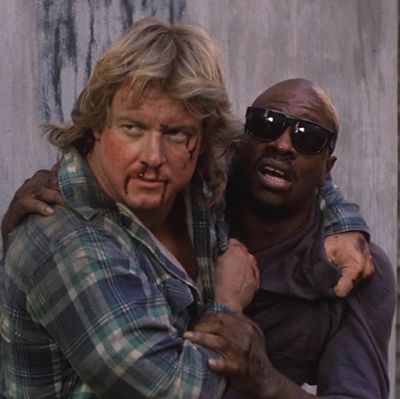
Nearly an hour into John Carpenter’s They Live (1988), the gum-chewing, ass-kicking Roddy Piper engages Keith David in one of the most ridiculous bouts of fisticuffs in movie history. The fight lasts for six minutes and purportedly serves no purpose; its incomprehensible duration is the joke, and in lieu of a punch line, Carpenter gives us punches. Lots of punches. It is, as philosopher and cultural critic Slavoj Žižek puts it, totally irrational, and totally brilliant.
WWF legend Piper, who died this week at 61, plays Nada, a transient construction worker whose name we only know from the credits. He wanders into town looking for work, and instead stumbles upon an alien plot to control humanity using consumerism. These aliens are really ugly things with formaldehyde faces, all scarred and piebald like syphilis victims. They hide among the denizens of Los Angeles, working white-collar jobs, controlling the television stations, embedding their insidious subliminal messages in billboards, magazines, advertisements — Obey. Consume. Watch TV. Marry and reproduce. Nada finds a pair of plastic sunglasses that tear down the veneer, exposing the ghouls and cryptograms in black and white, which lends They Live a B-movie air.
Nada meets a construction worker named Frank, played by Keith David, and they become … well, not friends. Acquaintances, maybe. After Nada confronts the alien world, shooting up a bank, killing a bunch of aliens, and going on the lam, he meets with Frank in a squalid back alley. Frank is delivering a week’s pay to Nada. But Nada throws the money, no longer important, to the ground. He wants Frank to wear the glasses and see the world as it really is.
But Frank doesn’t want to wear the glasses. There’s no good reason, other than Frank thinking Nada is crazy — he just doesn’t want to. As with all of Carpenter’s movies, They Live is rife with cultural commentary, though this particular scene is a bit tougher to vivisect because it’s so utterly simple: You can say that Frank doesn’t want to disrupt the daily tranquility of his life by expunging his ignorance; or it’s a send-up of the gleeful histrionics of Carpenter’s Big Trouble in Little China (which was, for Carpenter, a big-budget endeavor that left him disillusioned with Hollywood). You can read this as a commentary on race, with Frank, a hardworking middle-class man with a family, not wanting to take orders from a white guy who just sauntered into town, not wanting to see, and acknowledge, that he’s still a slave to an despotic regime of beings. But on a literal level, Frank is just being a jerk. Nada’s a jerk, too, and Carpenter needs them to fight. So Nada slugs Frank in the jaw, a novel way to counter Frank’s reluctance.
“I’m trying to save you and your family’s life,” Nada says. “Put on these glasses, or start eating that trash can.”
Frank chooses the trash can.
The two burly men trade blows all over the alley, which is replete with Dumpsters and debris. Their skirmish goes on for six minutes, devoid of music and logic. There are fleeting pauses, during which the men catch their breath before going at it again, and at one point Nada accidentally shatters the back windshield of Frank’s car, dropping the plank of wood and professing, “Oh, man, I’m sorry!” The broken window is, for a moment, more important than the ghouls and glasses.
The fight plays an intriguing role in John Carpenter’s oeuvre. Carpenter has always had a fascination with the toxic, intoxicating appeal of masculinity. His masterpiece, The Thing, depicts a coterie of men who turn a fight for survival against a shape-shifting alien into a pissing contest. Kurt Russell has donned the mantel of Manly Man for Carpenter three times, with increasing irony: the one-eyed outlaw-cum-hero Snake Plisken in Escape From New York; the bearded helicopter pilot MacReady in The Thing; and the inept trucker Jack Burton, who thinks he’s an action hero, in Big Trouble in Little China. But Russell, an expert at putting on airs, always plays his manly roles with a knowing wryness. (It’s all in the reflexes.) Roddy Piper plays Nada as straight as a die, and that’s why the fight scene in They Live is absurd (in both the literal and Camus senses), but not necessarily uproarious. In a decade replete with beefcake action, the Nada-and-Frank fight remains unsurpassed as a Dadaistic display of masculinity. It recognizes its own inanity, that the very joke of its excessiveness would be ruined if punctuated by any symbolism. Instead of a bodybuilder pummeling nameless baddies, à la Arnold, or the flair and flamboyance of the WWF (Piper met Carpenter at WrestleMania III in 1987), we get two working-class guys in literal blue collars duking it out because they’re … stubborn. Their ability to communicate verbally deteriorates into an exchange of grunts and groans: “Ugh,” and “Come on,” and, more articulately, “You dirty motherfucker.” The whole scene is a satire of testosterone, manifested in a fistfight without a point.
The oft-parodied scene is also a sort of stymied respite from the rest of the film’s monster-movie-meets-political-paranoia personality. The subliminal messages, the ominous ubiquity of mass media, the abuse of power by authority figures — all take a seat, temporarily tapped out by Rowdy Roddy Piper. Frank eventually succumbs to Nada and wears the glasses. He sees the ghouls, and suddenly the fight is over. The prole rage subsides. Both men shamble away, battered and bloodied, and proceed to save the world. Roddy Piper’s flannel shirt never even comes untucked.

